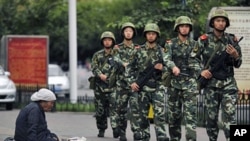Teams of heavily armed Chinese riot police are patrolling the streets in the capital of the country's remote western Xinjiang region on the the one-year anniversary of the country's worst ethnic violence in decades.
Security forces fanned out on Monday across Urumqi, where deadly riots that began July 5 between Muslim Uighurs and majority Han Chinese killed nearly 200 people and injured more than 1,600.
While visitors have been able to travel freely throughout Xinjiang, guards check their bags at airports, train stations, bus stops and hotels.
Authorities in the majority Muslim region have recently installed 40,000 security cameras in and around Urumqi. Several thousand new police officers have been hired since the riots. Xinjiang's security budget has nearly doubled to $428 million, or 2.9 billion yuan.
The region's communications links to the outside world, including Internet access, international telephone calls and text-messaging, were cut off for more than six months, but restored earlier this year.
Uighurs are an ethnic Turkic Muslim group linguistically and culturally distinct from Han Chinese, the country's majority ethnic group. Many Uighurs resent what they say is Beijing's heavy-handed control over Xinjiang and government restrictions on religion and culture. Uighurs say they also suffer from job discrimination and poverty.
Uighur exile groups say these factors, plus long-simmering resentment about ethnic Han migration to the region, led to the unrest.
Beijing blames the deadly fighting on Uighur separatists it says are seeking independence for the restive frontier region. It says the riots were orchestrated by Uighurs living abroad, but rights groups and Uighur activists say Beijing exaggerates the threat posed by militants.
Some information for this report was provided by AP, AFP and Reuters.




